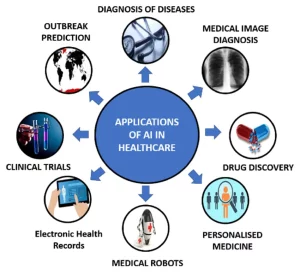Artificial Intelligence (AI) has emerged as a transformative force reshaping virtually every aspect of the world around us. From revolutionising healthcare and finance to fundamentally altering education, transportation, agriculture, entertainment.Environmental sustainability, AI’s impact is profound and pervasive. At its core, AI encompasses technologies that enable machines to simulate human intelligence, learn from data, and make autonomous decisions. As AI continues to evolve and permeate deeper into our daily lives, understanding its implications, challenges. Opportunities becomes increasingly crucial. In this exploration. We delve into the multifaceted ways in which AI is transforming our world, shaping the present and defining the future.
Definition and importance of AI:
Artificial Intelligence (AI) refers to the simulation of human intelligence processes by machines, primarily computer systems. These processes include learning ,reasoning and self-correction. AI technologies enable machines to perform tasks that typically require human intelligence. Like visual perception, speech recognition, decision-making, and language translation. The importance of AI lies in its capacity to augment human capabilities, streamline processes, and drive innovation across various domains. By automating repetitive tasks, analyzing large datasets to extract insights, and making predictions based on patterns. AI holds the potential to enhance efficiency, productivity, and problem-solving capabilities in numerous industries. Moreover. AI facilitates the development of advanced technologies like autonomous vehicles, personalized medicine. Intelligent virtual assistants, thereby revolutionizing how we live, work, and interact with the world around us.
Overview of AI’s transformative impact:
AI’s transformative impact is ubiquitous, revolutionizing sectors from healthcare and finance to education. transportation, agriculture, entertainment, and environmental sustainability. It enables faster diagnoses and personalized treatments in healthcare, streamlines financial operations with automated trading and fraud detection. Fosters personalized learning experiences in education. In transportation, AI powers autonomous vehicles and optimizes traffic management. While agriculture benefits from precision farming and supply chain optimization. Entertainment and media leverage AI for content recommendation and creation. While environmental sustainability efforts rely on AI for climate modeling and waste management. Overall, AI’s influence spans industries, enhancing efficiency, innovation, and sustainability across the board.
AI Applications:
Healthcare: Diagnosis, treatment, and management:
In healthcare, AI is revolutionizing diagnosis, treatment, and management processes, ushering in a new era of precision medicine and patient care. AI-powered diagnostic systems analyse medical images, such as X-rays, MRIs, and CT scans, with remarkable accuracy, aiding healthcare professionals. Moreover, AI algorithms can analyze vast amounts of patient data to identify patterns and trends, enabling personalized treatment plans. This not only improves treatment outcomes but also reduces healthcare costs by avoiding unnecessary procedures and medications. Additionally. AI assists in healthcare management by optimizing hospital operations, scheduling appointments, and predicting patient admission rates Ultimately enhancing the overall efficiency and effectiveness of healthcare delivery systems. As AI continues to evolve, its impact on healthcare promises to transform. The way diseases are diagnosed, treated, and managed, ultimately leading to improved patient outcomes and quality of life.
Finance: Trading, fraud detection, and customer service:
In the realm of finance, AI is reshaping trading strategies, fraud detection methods.Customer service practices, driving efficiency and security in the industry. AI-powered algorithms analyze vast amounts of financial data at lightning speed, enabling traders to make more informed decisions and execute trades with precision. These algorithms can identify complex patterns and trends in market data, helping traders capitalize on opportunities and mitigate risks. Moreover, AI plays a crucial role in fraud detection by continuously monitoring transactions and identifying suspicious activities in real-time.. Additionally, AI-powered chatbots and virtual assistants enhance customer service by providing instant responses to inquiries, facilitating transactions, and offering personalized recommendations. This not only improves customer satisfaction but also reduces operational costs for financial institutions. Overall, AI’s applications in trading, fraud detection, and customer service are transforming the finance industry, making it more efficient, secure, and customer-centric.
Education: Personalized learning and administrative tasks:
In education, AI is revolutionizing both personalized learning experiences for students and administrative tasks for educators and administrators alike. Through AI-powered adaptive learning platforms, students can receive customized learning materials. Feedback tailored to their individual needs and learning styles. These platforms analyze student performance data to identify strengths and weaknesses, allowing educators to personalize lesson plans and interventions accordingly. Furthermore, AI streamlines administrative tasks such as grading, scheduling, and resource allocation. Freeing up educators’ time to focus on teaching and student engagement. Automated systems can handle routine administrative duties efficiently, reducing manual workload and increasing productivity. As AI continues to advance, its integration into education holds the promise of fostering more inclusive, engaging, and effective learning environments. While streamlining administrative processes for educational institutions.
Transportation: Autonomous vehicles and logistics:
In the transportation sector, AI is driving significant advancements, particularly in the development and implementation of autonomous vehicles and logistics management. Autonomous vehicles, powered by AI algorithms, offer the potential to revolutionize how people and goods are transported. These vehicles utilize sensors, cameras, and advanced algorithms to perceive their surroundings, make real-time decisions, and navigate safely without human intervention. The integration of AI into logistics management further enhances efficiency and reliability in supply chain operations. AI-powered algorithms optimize routes, predict demand, and manage inventory, leading to reduced transit times, lower costs, and improved overall logistics performance. As a result, businesses can achieve greater operational efficiency and customer satisfaction while simultaneously reducing environmental impact through optimized resource utilization. The ongoing advancements in AI technology are poised to transform the transportation industry, making transportation safer, more sustainable, and more efficient than ever before.
Agriculture: Precision farming and supply chain optimization:
In agriculture, AI is revolutionizing farming practices through precision farming techniques and supply chain optimization. Precision farming, enabled by AI-powered tools and sensors, allows farmers to monitor and manage their fields with unprecedented accuracy and efficiency. These technologies analyze data from various sources, including satellite imagery, weather forecasts, and soil sensors, to provide insights into crop health, nutrient levels, and water usage. By precisely targeting inputs such as water, fertilizers, and pesticides, farmers can optimize resource usage, minimize waste, and increase crop yields. Furthermore, AI facilitates supply chain optimization by tracking and managing inventory, predicting demand fluctuations, and optimizing transportation routes. This results in more efficient distribution of agricultural products, reduced food waste, and improved profitability for farmers and food producers. Overall, AI’s integration into agriculture is enhancing sustainability, productivity, and profitability throughout the entire food production and distribution process.
Entertainment: Content recommendation and creation:
In the realm of entertainment, AI is reshaping content recommendation and creation, offering personalised experiences to consumers while streamlining production processes for creators. AI-powered recommendation systems analyze user preferences, viewing history, and behavior to deliver tailored content recommendations across various platforms, including streaming services, music apps, and social media. By leveraging machine learning algorithms, these systems continually refine their recommendations, enhancing user engagement and satisfaction. Moreover, AI is transforming content creation by automating tasks such as video editing, sound mixing, and image processing. Creative professionals can utilize AI tools to generate personalized content at scale, accelerating production timelines and reducing costs. Additionally, AI-driven algorithms can analyze audience feedback and market trends to inform content strategies, enabling creators to produce content that resonates with their target audience.
Environmental Sustainability: Climate modeling and energy efficiency:
In the pursuit of environmental sustainability, AI is playing a crucial role in climate modeling and energy efficiency initiatives. AI-driven climate modeling systems analyze vast amounts of data from various sources, including satellite observations, weather stations, and climate simulations, to better understand and predict complex climate patterns and phenomena. These models enable scientists and policymakers to assess the impacts of climate change, develop mitigation strategies, and make informed decisions to safeguard the planet’s ecosystems and populations. Additionally, AI is instrumental in optimizing energy efficiency across industries and sectors. Machine learning algorithms analyze energy consumption patterns, identify inefficiencies, and recommend strategies for reducing energy usage and carbon emissions.By leveraging AI technologies in climate modeling and energy efficiency efforts, stakeholders can work towards a more sustainable future, mitigating the impacts of climate change and promoting responsible resource management.
Ethical and Social Considerations:
Bias and fairness:
Addressing bias and ensuring fairness in AI systems is a critical concern as these technologies become increasingly integrated into various aspects of society. AI algorithms are trained on vast amounts of data, which may reflect existing biases present in society, leading to unfair or discriminatory outcomes. Consequently, efforts to mitigate bias and promote fairness in AI systems are essential to uphold principles of equity and justice. This involves implementing robust measures throughout the AI lifecycle, including data collection, algorithm design, and model evaluation. Strategies such as diverse and representative dataset collection, bias detection and mitigation techniques, and fairness-aware algorithm design are employed to minimize the impact of biases in AI systems. Moreover, transparency and accountability mechanisms are necessary to ensure that AI systems are deployed responsibly and ethically.
Privacy and data security:
Privacy and data security are paramount concerns in the era of AI, as these technologies often rely on vast amounts of personal data to function effectively. With AI systems collecting, analyzing, and processing large volumes of data, there’s a heightened risk of privacy breaches and unauthorized access to sensitive information. Safeguarding privacy and ensuring robust data security measures are essential to maintain trust and protect individuals’ rights. This involves implementing encryption protocols, access controls, and anonymization techniques to safeguard data throughout its lifecycle. Additionally, transparent data usage policies and consent mechanisms empower individuals to make informed decisions about their data and how it’s utilized by AI systems. By prioritizing privacy and data security in AI development and deployment, stakeholders can mitigate risks and uphold individuals’ rights to privacy in an increasingly data-driven world.
Job displacement:
Job displacement, a consequence of technological advancements and economic restructuring, has become a prevailing concern in today’s workforce. As industries adopt automation, artificial intelligence, and other disruptive technologies. Many traditional roles are rendered obsolete, leaving workers displaced and struggling to find new employment opportunities. The rapid pace of technological change exacerbates this issue. As the skills required for emerging jobs often differ significantly from those of the displaced workforce. Addressing this issue necessitates proactive measures such as retraining programs, educational initiatives focused on future-proof skills. Policies that promote economic resilience and inclusivity. Only through concerted efforts can societies mitigate the adverse effects of job displacement. Ensure a more equitable and sustainable future for all.
Regulation and governance challenges:
Regulation and governance challenges loom large in the face of rapid technological advancements and shifting economic landscapes. As new technologies emerge, such as artificial intelligence, biotechnology, and blockchain, regulators often struggle to keep pace with their development and implementation. This lag can create regulatory vacuums, leaving industries and consumers vulnerable to potential risks and abuses. Additionally, the interconnectedness of modern economies means that regulatory decisions in one country can have far-reaching implications globally. Addressing these regulation and governance challenges requires collaboration among governments, industry stakeholders. Civil society to develop agile and adaptive regulatory frameworks that promote innovation while safeguarding against potential harms. It also necessitates enhancing regulatory capacity through investment in expertise, technology. The international cooperation to ensure that regulations remain relevant and effective in the face of rapid change.
Conclusion:
In conclusion, AI is profoundly altering our world, driving innovation and reshaping industries. However, it also poses ethical and regulatory challenges. To navigate these complexities, we must prioritize transparency, fairness, and accountability in AI deployment. By doing so, we can maximize its benefits while mitigating potential risks, paving the way for a more inclusive and prosperous future.





